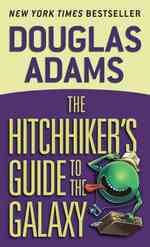I think WordPress’ spell-check might explode if I add another sentence or two to this….
—
 The Restaurant at the End of the Universe
The Restaurant at the End of the Universe
by Douglas Adams
Series: The Hitchhiker’s Guide to the Galaxy Trilogy, #2
Mass Market Paperback, 245 pg.
Ballantine Books, 1995
Read: February 13-15, 2016

If you’ve done six impossible things this morning, why not round it off with a breakfast at Milliways, the Restaurant at the End of the Universe?
I think in the past, I’ve enjoyed The Restaurant at the End of the Universe more than this time, but I’m not sure why. Which is not to say that I didn’t have a blast, I just usually have more fun. From the intricate — and death-defying — difficulty of making a good cup of tea; to the extreme lengths some people will go to for a dining experience; to perspective that a little cake can give; to considering what color a wheel should be or whether fire should be nasally-inserted — this book covers all the bases. While still episodic in nature, it seems less so than its predecessor — and far less so than its successor. It’s a stronger novel, not quite as funny, but still better than most “funny” or “light” SF than you’ll find.
[Gargravarr] had rather liked Zaphod Beeblebrox in a strange sort of way. He was clearly a man of many qualities, even if they were mostly bad ones.
Most of this book showcased the ex-President of the Galaxy, Zaphod Beeblebrox the First (how is great-grandfather was Zaphod the Fourth lies in one of the best lies Adams ever penned). Now Zaphod’s not my favorite character — actually, I typically dislike him as a character. As a joke-generator, a font of one-liners? He’s great. Probably most of the quotable lines in this book are his (even Arthur’s best line is immediately denigrated by him “Yeah, and don’t you wish you hadn’t?”).
We see the reason for his stealing of The Heart of Gold in the last book, we’re taken on a wild and twisty ride for him to complete his quest and then . . . it just stops. I’m sure it’s supposed to be in an absurd way or something, but it seems pointless (probably the point).
And then we’re off to Milliways. Ahhh, Milliways — this is an absolutely perfect part of the book. That this is the book’s title is absolutely fitting. There’s nothing about it I don’t like here — Max Quordlepleen’s banter (the oddly bittersweet introduction of him), Hotblack Desiato (and his tax plan), the Dish of the Day . . . I’m going to shut up before I just copy and paste the whole thing.
The rest of the book focuses on Arthur (and Ford, but, a little less), who I like, but don’t laugh at nearly as much.
“Poor Arthur, you’re not really cut out for this life are you?” [Trillian asked]
“You call this life?”
Something I’ve been thinking about this read-through is this: why Arthur? He’s one of Ford’s oldest friends on Earth — but we know he has multiple friends, he could’ve picked any of them — why Arthur? Surely, Ford would’ve had at least an inkling that Arthur would turn into the whiny Monkey-man that Zaphod can’t stand. It’s easy to see why Tricia McMillan would go off with Zapod as Phil over this wet blanket, well, towel. Trillian here has the same thought — and if we’re given a good explanation for that, I don’t remember it. Any of you have a guess (or a quotation) to justify Ford’s improbable choice?
Now, I may have sounded less that totally satisfied with this book — which is oddly true. I do think the Golgafrinchan Ark Fleet Ship B story is pretty “blah” and goes on far too long (into the next book). But it gives us gems like this:
It is a curious fact, and one to which no one knows quite how much importance to attach, that something like 85 percent of all known worlds in the Galaxy, be they primitive or highly advanced, have invented a drink called jynnan tonnyx, or gee-N-N-T’Nix, or jinond-o-nicks, or any one of a thousand or more variations on the same phonetic theme. The drinks themselves are not the same, and vary between the Sivolvian “chinanto/mnigs” which is ordinary water served at slightly above room temperature, and the Gagrakackan “tzjin-anthony-ks” which kills cows at a hundred paces; and in fact the one common factor between all of them, beyond the fact that the names sound the same, is that they were all invented and named before the worlds concerned made contact with any other worlds.
making it hard to complain too much.
There are a lot of laughs to be had here — I didn’t even mention Marvin’s contributions, which were just gold. And any time with Adams is worth it. A must-read follow-up to the classic, Hitchhiker’s Guide to the Galaxy.
—–




